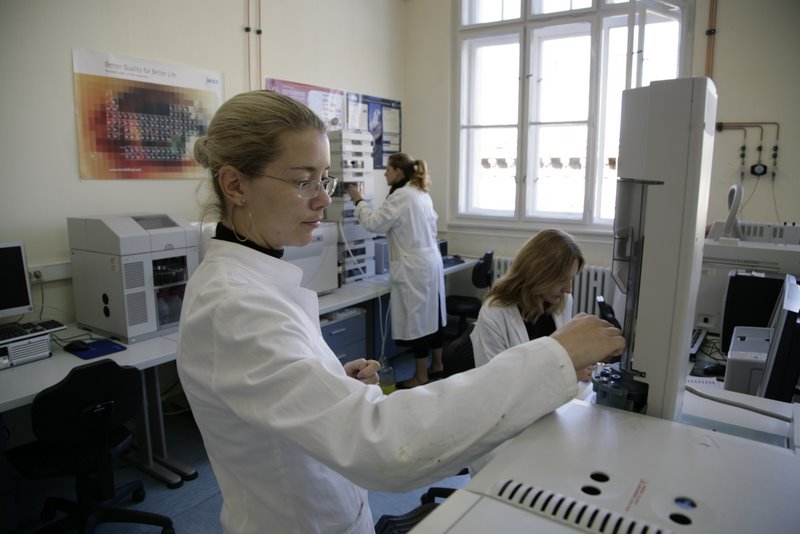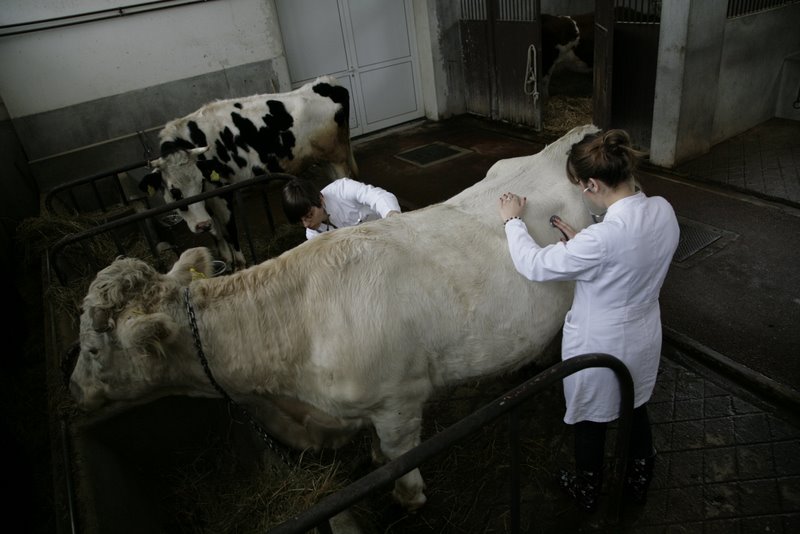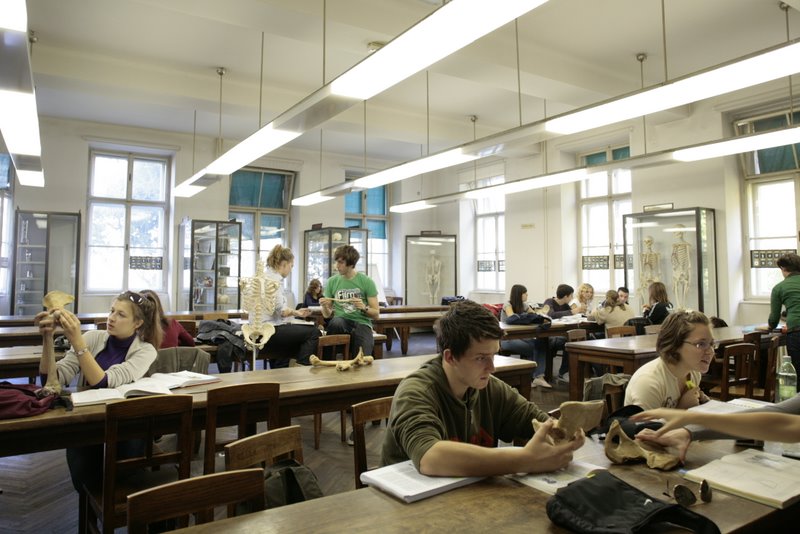FACULTY OF PHARMACY AND BIOCHEMISTRY - FACULTY OF VETERINARY MEDICINE -SCHOOL OF MEDICINE - SCHOOL OF DENTAL MEDICINE
FACULTY OF PHARMACY AND BIOCHEMISTRY
http://www.pharma.hr/

Faculty of Pharmacy and Biochemistry
A. Kovačića 1
HR-10000 Zagreb, Croatia
Phone: + 385 1 48 56 201
Fax: + 385 1 63 94 400
E-mail: dekanat@pharma.hr
DEPARTMENTS: 15
CENTRES: 2
CHAIRS: 17
TEACHING STAFF: 87
NON-TEACHING STAFF: 65
STUDENTS: 1100
ECTS-COORDINATOR
Associate Professor Marijana Zovko Končić, PhD
E-mail: mzovko@pharma.hr
The Faculty of Pharmacy and Biochemistry is the only faculty in Croatia dedicated entirely to teaching and research in pharmacy and medical biochemistry. Pharmacy studies were started at the University of Zagreb in 1882. The name Faculty of Pharmacy and Biochemistry was adopted in 1963, and since 1986 the Faculty has organised two study programmes, one in Pharmacy and the other in Medical Biochemistry.
Today, the Faculty offers graduate programmes in Pharmacy and in Medical Biochemistry, a postgraduate (PhD) programme in Pharmaceutical-Biochemical Sciences and postgraduate specialist programmes. In addition, the Faculty offers continuing education for Masters of Pharmacy and Medical Biochemistry.
The five-year master programmes of Pharmacy and Medical Biochemistry (10 semesters, 300 ECTS points) are divided in three areas of academic focus: basic, biomedical and pharmaceutical sciences and basic, biomedical and medical biochemistry sciences, respectively.
The goals and objectives of Master of Pharmacy programme are to educate students for competent participation in the design, development and delivery of medications for safe and efficient therapy.
The programme emphasizes problem solving, critical thinking, and latest scientific findings related to medicines and modern medical treatments. Students learn to practice as patient-oriented healthcare professionals who will work as team with other health care providers.
The goals and objectives of Master of Medical Biochemistry programme are to train students to examine human life in health and disease from the chemical, biochemical and molecular-biological aspects. The programme emphasizes problem solving, critical thinking, and latest scientific findings related to the molecular mechanisms underlying a multitude of diseases as well as novel diagnostic methods. The aim of this programme is to educate professionals who will be able to help physicians to diagnose the disease and follow up the therapy by choosing appropriate procedures and interpreting the obtained results.
Graduate programmes constitute the basis for postgraduate extension of knowledge and acquisition of special skills and competences. Postgraduate specialist studies at the Faculty of Pharmacy and Biochemistry, are a form of continuing education, or life-long learning, for pharmacists, medical biochemists and related professionals seeking to perfect their knowledge in one area of their specialty. The goal of PhD programme in Pharmaceutical-Biochemical Sciences is to prepare independent, creative scientists to excel in academia, the pharmaceutical industry and other research institutions.
In our modern educational, research, and practice settings, student are prepared to excel in a variety of pharmaceutical careers such as working in community and hospital pharmacies, the pharmaceutical industry (research, development, production, control and marketing of drugs), Agency for Medicinal Products and Medical Devices, research and educational institutions, and drug distribution enterprises.
Masters of Medical Biochemistry get mainly employed in the health care system (medical-biochemistry laboratories in primary health care, polyclinics, hospitals and clinical hospital centres), research and academic institutions, and bio-research and diagnostic products distribution enterprises.
The research carried is of a high international standard and is world-leading in several areas, such as basic, biomedical, pharmaceutical and medical biochemistry sciences (drug development, drug delivery, nanotechnology, pharmacogenomics, chronic diseases, glycobiology, pharmacobotanics, drug resistance, food and diet therapy, biomedical potential of natural resources, pharmaceutical analysis).
INTEGRATED BA&MA STUDY PROGRAMMES
|
INTEGRATED BA&MA PROGRAMMES |
DURATION(semesters) |
ECTS |
LANGUAGUE OF INSTRUCTION |
|
Pharmacy
|
10
|
300
|
Croatian
|
| Medical Biochemistry | 10 | 300 | Croatian |
DOCTORAL STUDY PROGRAMMES
|
DOCTORAL STUDY PROGRAMMES
|
DURATION
(semesters)
|
ECTS
|
LANGUAGE OF INSTRUCTION
|
|
Pharmacy and Biochemical Sciences
|
6 |
180
|
Croatian
|
STUDY COURSES IN ENGLISH
|
COURSE TITLE |
SEMESTER Winter / Summer |
ECTS |
STUDY LEVEL BA / MA |
| Medicinal chemistry | W | 3,5 | Integrated BA&MA |
| Personalized HealthCare | W | 2 | Integrated BA&MA |
Faculty of Veterinary Medicine
Heinzelova 55
HR-10000 Zagreb, Croatia
Phone: + 385 1 23 90 111
Fax: + 385 1 24 41 390

E-mail: info@vef.hr
DEPARTMENTS: 31
CHAIRS: 5
TEACHING STAFF: 169
NON-TEACHING STAFF: 153
E-mail: renata.purgar@vef.hr
Professor Alen Slavica, DVM, MSc, PhD, Dipl. ECZM (WPH)
Phone: +385 1 2390 156
E-mail: alen.slavica@vef.hr
Associate Professor Igor Stokovic, PhD, DVM
Phone: +385 1 2390 221
E-mail: igor.stokovic@vef.hr
The Faculty of Veterinary Medicine was founded in 1919 as the Veterinary College and reorganized into a faculty unit of the University of Zagreb in 1924. The mission of the Faculty is to improve and promote its leading educational and academic role and to secure the leading scientific position in the field of veterinary medicine and adjoining sciences not only in Croatia but throughout the whole region. Those tasks will be carried out in the future in accordance with tradition, through organized personnel policy and supported by modern equipment.
Intensive development of regional cooperation within the scope the EU is expected, especially with the associations and organizations such as VetNEST, various faculties and universities with which a direct cooperation has already been agreed on. Faculty was positively evaluated in 2002 by the EAEVE expert group.
University study of veterinary medicine lasts 12 semesters. During the first nine semesters students gain knowledge of basic preclinical and clinical subjects. The last three semesters are dedicated to specialized fields so that students gain specific knowledge of companion animals, farm animals and horses, food hygiene and technology and veterinary public health.
Throughout the course of studies students acquire fundamental knowledge in the field of natural sciences, morphology and physiology of animals, pathological processes, zoonoses, and infectious and non-infectious diseases. Competence and understanding of the effects of xenobiotics on animals is acquired as well as comprehension of medical ethics. Graduates acquire competence in the field of veterinary-sanitary control.
The aim of the Faculty is to educate future doctors of veterinary medicine who will be capable of carrying out veterinary practices in order to protect both animals and people. Obligatory elective courses will provide them with the additional skills and knowledge they will then apply to animal health protection, movement control of contagious diseases and zoonoses, and within the scope of activities of veterinary inspection, food control of animal origin and veterinary public health.
Research makes an integral part of the Veterinary faculty’s activities. Most of the research at the Faculty is carried out through projects which are long-term and are funded by the Ministry of Science, Education and Sports. Research projects serving the needs of the economy, local administrative units, and other clients are supported by the Ministry of Agriculture, Forestry and Water Management through their VIP projects, State Institute for the Protection of Nature, Croatian Motorways, and the City of Zagreb. Science and Technology projects are funded by the Ministry of Science, Education and Sports. International projects are carried out either in cooperation with some EU countries or are co-financed by the corresponding ministries. In the forthcoming period the Faculty aims to direct a major part of its research activities to the pre-accession scientific EU funds, particularly towards the 7th Research Framework Programme (FP7). Such an orientation would also provide funding for training at the international level for both research trainees and Faculty assistants, as well as for the whole teaching and research staff; this would in turn improve their competitiveness on the scientific market.
|
INTEGRATED BA&MA STUDY PROGRAMME |
DURATION(semesters)
|
ECTS |
LANGUAGUE OF INSTRUCTION |
|
Veterinary Medicine
|
12
|
360
|
Croatian
|
|
DOCTORAL STUDY PROGRAMME
|
DURATION
(semesters)
|
ECTS
|
LANGUAGE OF INSTRUCTION
|
|
Veterinary Science
|
6 |
180
|
Croatian
|
|
COURSE TITLE |
SEMESTER Winter / Summer |
ECTS |
STUDY LEVEL BA / MA |
| Pathology of laboratory animals | S | 2 | Integrated BA&MA |
|
Parasitology in public health
|
S |
2
|
Integrated BA&MA
|
School of Medicine
Šalata 3

HR-10000 Zagreb, Croatia
Phone: + 385 1 45 66 777
Fax: + 385 1 45 66 701
E-mail: mef@mef.hr
DEPARTMENTS: 32
CHAIRS: 32
TEACHING STAFF: 500
NON-TEACHING STAFF: 290
STUDENTS: 1825
INSTITUTIONAL PROFILE
The School of Medicine is the central institution devoted to medical education, research and professional development in the field of biomedicine and health in Croatia. Founded in 1917, the Zagreb School of Medicine is the alma mater of numerous generations of physicians and researchers from Croatia and all over the world. Based on its long-standing history of educating physicians from abroad, the Zagreb School of Medicine established its own integral programme of studies taught in the English language in 2003.
Today the Zagreb School of Medicine offers a graduate programme of medical studies conferring a degree of Doctor of Medicine, a variety of postgraduate programmes, ranging from the postgraduate specialist course of studies to the doctoral programme of studies, and a wide range of continuous professional development programmes.
Ever since its outset, and particularly during the implementation of the Bologna process, the school has attempted to harmonize its curricula with the recent advances in medical education and research. The present six-year curriculum stimulates student mobility within related institutions of the University of Zagreb, as well as within other Croatian (Rijeka, Split and Osijek) and international partner schools.
The course of medical studies lasts six years, thus uniting the undergraduate and the graduate level into one single whole (0+6), which has already been accepted by the majority of European universities.
The curriculum leading to the Doctor of Medicine degree at the University of Zagreb Medical School comprises mandatory general premedical courses, as well as four major groups of professional courses such as: basic medical sciences, pre-clinical medicine, clinical medicine and public health. When compared to other medical schools in neighbouring countries, our advantage is an early integration of public health and health management courses in the undergraduate studies’ curriculum. Along with regular academic courses, electives are carried out solely by studying significant problems in medical practice. As far as the teaching is concerned, the focus is shifted from lectures to other, more practical forms of teaching, such as seminars, demonstrations, consultations and clinical audits, where students gain experience in clinical settings, as well as at the facilities of local health centres. Centred on tutorials integrated case-based modules have also been included into the curriculum.
The study of pre-medical disciplines comprises an introduction to the physical, chemical and biological basis of life, whereas in basic medical courses students acquire knowledge and understanding of the structure and function of the human body. The programme of pre-clinical courses comprises the understanding of disease mechanisms, studying their effects and causes on cadavers, drug action and the approach to and examination of patients. The clinical courses are focused on various diseases, methods of their detection (diagnosing), prevention and therapy. Relevant to public health courses are the matters concerning environmental and social health factors together with the physician’s role in the prevention and treatment of diseases. Students also gain insight into elementary research methods, statistics and medical informatics.
Professional ethics is given special coverage throughout the whole course of study with a separate course offered in the third year.
In the final diploma exam taken at the end of the study, prospective physicians are expected to have gained knowledge and understanding of the most common diseases, their treatment and the patients’ rehabilitation.
The fact that physicians will be in greater demand in the future presents an additional challenge to the educational system. Due to the recent generation replacement process, there is a growing demand for educated/certified physicians in all fields of medical practice, as well is in the basic sciences. Physicians who have graduated from the University of Zagreb School of Medicine are educated primarily for the general practice profile. That means that they can start working in their profession immediately after the completion of the one-year internship period, i.e., after having passed the state licensure exam. However, the majority apply for residency positions in numerous specialty fields of medicine and work towards specializing for a particular professional profile. Another group of graduates stays in research and fill the vacancies as research assistants who enrol the doctoral programme of studies in biomedicine and health. As a young faculty they are closely related to the Zagreb School of Medicine and they work towards their becoming professional, both in research and in teaching. Finally, a considerable number of graduates are attracted to the positions offered by the pharmaceutical companies, where they work as pharmaceutical representatives and consultants, while those interested in social aspects of medicine fill vacancies in the sector of public health and health management.
The number of scientific papers published in widely visible international journals is one of the best indicators of the scientific output of any academic or scientific institution. In this respect, the University of Zagreb Medical School best serves national interests in the field of medicine. During the 2000-2006 period authors affiliated to the School published 1,323 papers in journals covered by Current Contents. Among these there are 222 papers published in co-authorship with foreign researchers, mainly from the USA, Great Britain and Germany. Researchers of the Zagreb Medical School participate in various multi-centre research projects which resulted in 75 papers in the above period. The most prominent research highlights are: cell biology, neuroanatomy, hematological malignancies, congenital metabolic diseases, bone morphogenetic proteins, clinical endocrinology and diabetes and gynaecological ultrasound.
|
MD PROGRAMME |
DURATION(semesters) |
ECTS |
LANGUAGE OF INSTRUCTION |
|
Medicine
|
12
|
360
|
Croatian
|
STUDY PROGRAMME IN ENGLISH
|
MD PROGRAMME |
DURATION(semesters) |
ECTS |
LANGUAGE OF INSTRUCTION |
|
12
|
360
|
English
|
|
DOCTORAL STUDY PROGRAMMES
|
DURATION
(semesters)
|
ECTS
|
LANGUAGE OF INSTRUCTION
|
|
Biomedicine and Health Sciences
|
6 |
180
|
English
|
| Neuroscience | 6 |
180
|
Croatian
|
School of Dental Medicine
Gundulićeva 5

HR-10 000 Zagreb, Croatia
Phone: + 385 1 48 02 111
Fax: + 385 1 48 02 159
E-mail: dekan@sfzg.hr
DEPARTMENTS: 8
CHAIRS: 27
TEACHING STAFF: 114
NON-TEACHING STAFF: 50
STUDENTS: 500
Professor Hrvoje Brkić, DDS, PhD
Phone: + 385 1 48 02 111
E-mail: brkic@sfzg.hr
The Department of Odontology was established within the Medical School University of Zagreb in 1948. The School of Dental Medicine has been separate from the Medical School since the academic year 1962/1963, by decision of the Croatian Parliament in 1962. Today the School of Dental Medicine consists of 8 different dental departments: Department of Dental Anthropology, Department of Endodontics and Restorative Dentistry, Department of Pedodontics, Department of Periodontology, Department of Prosthodontics, Department of Oral Medicine, Department of Oral Surgery, and Department of Orthodontics with more than 400 undergraduates and 100 postgraduate students.
Dental Medicine studies differ considerably from general medicine studies, thus its importance has become well-known and recognized worldwide. Dental Medicine studies are generally carried out worldwide in independent schools of dental medicine, with the exception of only a few countries.
Starting with the academic year 2005/2006 dental study programmes are carried out in accordance with the Bologna Declaration. Within the six-year integrated master programme students gain knowledge from basic biomedical courses, medical clinical courses, as well as from basic and clinical dental courses. Upon graduation, each Dental School graduate receives a diploma naming him/her “Doctor of Dental Medicine/”
Most dentists work as self-employed practitioners in general practice, providing dental care to the public and/or privately. Other options are to work in a variety of specialities in hospital dentistry, community dentistry, corporate practices, industry, or university teaching and research.
There is a longstanding tradition of research activity at the School of Dental Medicine. Research is conducted at each Department and in cooperation with research laboratories including the Ruđer Bošković Institute in Zagreb. Research is also carried out within research projects supported by Ministry of Science, Education and Sports, as well as under EU Framework programmes (FP6, FP7).
|
INTEGRATED BA&MA STUDY PROGRAMME |
DURATION(semesters)
|
ECTS |
LANGUAGUE OF INSTRUCTION |
|
Dental Medicine
|
12
|
360
|
Croatian
|
|
DOCTORAL STUDY PROGRAMME
|
DURATION
(semesters)
|
ECTS
|
LANGUAGE OF INSTRUCTION
|
|
Dental Medicine
|
6 |
180
|
Croatian
|
|
COURSE TITLE |
SEMESTER Winter / Summer |
ECTS |
STUDY LEVEL BA / MA |
| Dental treatment of the medically compromised pateints | W | 1,5 | Integrated BA&MA |


